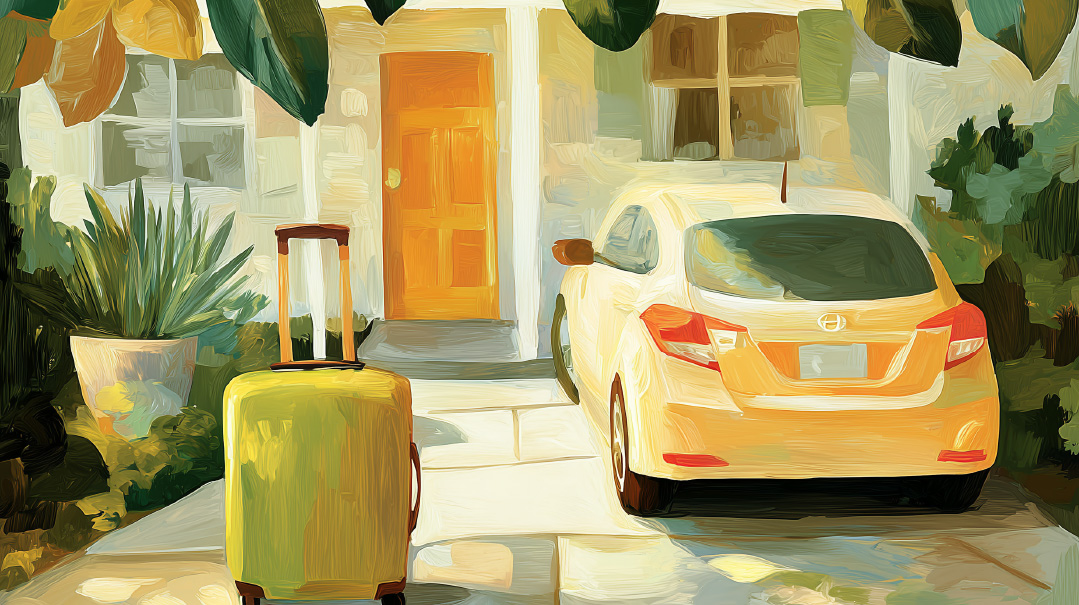What’s in a Name?
| May 27, 2025What’s in a name? I will know when I hold you in my arms after carrying you close to my heart

As told to Shoshana Gross
What’s in a name?
Annoyance. Exasperation. Maybe a tinge of sadness.
Because sometimes, you know that the name on your caller ID is going to add major complications to your life.
“Hi, Mommy! How are you? What did the doctor say about that rash on your arm?” Deflect. Distract. Sometimes it works. Medical aches and pains are one of Mommy’s pet topics, and if I can get her started on how the doctors of today are woefully underqualified, I can just wedge the phone under my ear and finally get some Shabbos cooking done, along with occasional expressions of sympathy.
Mommy ignores my questions, and the sinking sensation in my stomach is so strong, I have the sudden giddy feeling that I’m on one of those upside-down, stand-up roller coasters at Six Flags. Only Aryeh’s dare could have gotten me into that fix.
“…Aryeh!” Mommy’s voice is shrill. “Right?”
Time for damage control.
“I’m not sure I understood, Mommy,” I say soothingly. “What’s the problem with Aryeh?”
“What’s the problem?” I can picture Mommy, her stiff sheitel tilted in her rage, bright red lips pursed indignantly. “The problem is that he has no respect! No kibbud av v’eim! No concern for me! He knows my heart is weak, and he insists on aggravating me by not answering my calls. I can’t wait to have another einekel carrying his Zeidy’s name, but Aryeh isn’t responding to any of my texts and messages, and I can’t understand it! Of course he’s going to name his boy after Tatty, right? I want all my children to be zocheh to have a Shmuel Zundel. And Aryeh finally has a boy, eight years after his only girl. He’d better give that baby the right name!”
Uh-oh. The potato kugel is clearly not going to happen this week, and I should have expected this.
Every time Mommy calls, I know I’m going to deal with something, but ever since my youngest brother Aryeh and his wife, Avital, had their long-awaited son, I knew this was going to be the granddaddy of all unpleasant situations.
I’m the oldest, the protective big sister who desperately tried to shield my siblings through the broken years of our childhood, but now I have no idea what to do.
W
hat’s in a name?
Fear. Terror. Shame.
Shmuel Zundel is a neatly trimmed beard and heavy glasses, a heavier hand, and a tongue sharper than Mommy’s favorite knife.
My father was the living expression of his parents’ post-Holocaust aversion to emotions, as they built a family with tools that Hitler shattered.
My childhood consisted of walking on eggshells and retreating to the back of my closet, surrounded by the smell of mothballs, when Tatty yelled. The entire house reflected Tatty, down to the snowy doily that adorned his favorite leather armchair. The furniture was precisely placed. Meals were fleishig, and conversation was mainly a monologue while we sat and picked at our food.
Sometimes I wonder who my father could have been if his traumatized parents had treated him differently. He grew up emotionally deprived, and did a good job passing that on to his children. It was impossible to please Tatty. If I got a 96 on my report card, he always wanted to know why it wasn’t 100. But as much as I suffered, I knew my two younger sisters suffered even more. Tatty didn’t mellow with age, and Aryeh — the only son, the ben zekunim — was desperate to escape the intense pressure of “carrying on the Forster family legacy.”
“Sit straight, Aryeh,” Tatty snapped as he cut another precise triangle of Mommy’s pot roast. “Your rebbi says you haven’t made as much progress on the sugya as I expected. We’re going to have an extra learning seder tomorrow morning right after vasikin.” Aryeh’s fingers were white around his fork. Mommy entered the dining room with a pitcher of ice water and set it on the table near Tatty.
“Aryeh will be learning with me tomorrow morning. He needs an extra seder,” he told Mommy.
“That’s wonderful, Shmuel.” Mommy beamed at Aryeh, who looked at her bleakly.
“Pass the salt, Chana,” Tatty demanded. “These potatoes need more flavor.”
The potatoes were perfect, I knew. Mommy’s cooking was a dream — maybe because she lived in one.
W
hat’s in a name?
Confusion. Betrayal. Blindness.
Mommy’s name is Chana, a name echoing the strength of Chana Haneviah, who fought for a child with the weapon of prayer. But Mommy never fought for her children. Faced with the unbearable reality of an emotionally unavailable husband and the children he was alienating, she retreated into a fantasy world. She invented her relationships and clung to the illusion of a picture-perfect family.
When I finally escaped the shackles of home and began to build my own life, she constantly invited me and the “adorable eineklach” for visits.
Despite everything, I wanted my children to have a relationship with their grandparents, but each visit threw me into a panic of anxiety.
“Mommy invited us again,” I groaned to my husband. “We haven’t been to my parents in months, but we have to think of a way to make it work. Remember last time?” Levi winced, and I shuddered. After a two-hour car trip to Brooklyn, our three boys had been bursting with energy, and when Yudi knocked over one of Mommy’s potted plants, Tatty gave us all a terrible tongue-lashing.
“We’ll make a trip out of the visit,” Levi said. “Stay at a nearby hotel the night before, go to the park in the morning, let the boys work off all their energy. When they’re tired out, feed them lunch, promise them the moon, and we go to your parents’ house for half an hour.”
“Mommy’s going to complain that the visit’s too short,” I sighed.
“Better she complains than have Tatty hurt the children,” Levi answered.
He was right.
But so was I.
“It’s ridiculous, Rivka,” Mommy scolded as we stood on the front steps before we left, with the boys already securely strapped into the car. “Why couldn’t you stay by us overnight instead of going to a hotel? Tatty would have loved to have you over for longer, right, Shmuel?”
Methodically going through the envelopes he’d just slid from the mailbox, Tatty grunted.
“See, Rivka?” Mommy said brightly.
I did.
“I’m sorry, Mommy, but this is just how it worked out. Thank you for the delicious cookies, and we’ll see you!” I said quickly, giving her a peck on the cheek before dashing to the car, where through the side window I could see movement that looked suspiciously like fighting. After sorting out the he-hit-me-and-he-took-my-snack bag, I sank into my seat, exhausted.
“When are we going to the ice cream store?” whined Yudi. “You promised, Mommy!”
“Right now, boys,” Levi said quickly.
The ice cream store, pizza for supper, as well as a new toy for each boy from Toys 4 U had procured their obedience for one precious half hour. And they behaved perfectly for that short amount of time, more like robots than healthy, growing boys. Tatty complimented me on my successful chinuch.
Right.
It was successful, but I wasn’t sure how much of it was chinuch.
As we pulled into the parking lot of the ice cream store with the boys arguing loudly about which flavor was best, all I could do was try to hold back the tears.
W
hat’s in a name?
Concealment. Secrets. Uncertainty.
“Mommy called yesterday,” Esther announces as soon as I pick up the phone.
“Oh?” I wait for Esther to continue. My youngest sister is a powerhouse kiruv rebbetzin in Tucson, Arizona, mother of a large family — and a deeply insecure daughter. Long after I left the house, she was still enduring Tatty, and it’s left scars that no one in her congregation can see.
“She said she isn’t going to survive if Aryeh doesn’t name the baby after Tatty. She ordered me to call Aryeh and tell him. I tried telling her that there are already a few babies named after Tatty, but she wouldn’t even listen,” Esther says.
I’m surprised she said anything to Mommy. It takes a lot for Esther to voice her feelings. Over the years, she got used to hiding everything. But I know something Mommy doesn’t — even today, seven years after Tatty’s petirah, Esther can’t bring herself to look at his picture. I wonder how she named her youngest child Shmuel Zundel. Maybe it helps that she calls my nephew Zundel instead of Shmuel.
“What should I do, Rivka?”
I mentally pull on my big-sister persona and don my usual role of problem-solver. “Nothing, Esther. I’ll call Mommy tonight and try to figure things out.” Esther’s sigh of relief echoes over the phone. “You just make arrangements to come in for the bris. At least the weather in December’s nicer in Miami!” I throw together the marinade for the grilled chicken while we swap travel plans. I’m flying from Newark, Esther’s coming from Tucson, and Malka is landing tomorrow afternoon to help arrange the bris. Malka is a professional party planner in Monsey, and she’ll do justice to this long-awaited simchah.
After a long, pleasant schmooze, I reluctantly hang up. There’s a load of whites patiently waiting for a spin in the washing machine, and then I have to do some damage control after Mommy’s manipulations.
I’m about to dial Mommy’s number when a piercing ring heralds Malka.
“Rivka, I’m going nuts!” she barks into the phone without any pretense of a hello. “Mommy called me about a million times at work, just when I was dealing with a really picky client, to tell me that she’s going to die, and it will be my fault if I don’t call Aryeh and tell him to name his baby after Tatty!”
“It’s another one of her campaigns,” I say.
“I don’t get it,” Malka complains. “Both me and Esther named our youngest boys after Tatty, and she has two grandchildren named Shmuel Zundel. Why is Mommy treating this like a life-and-death situation?”
Malka can spot the difference between Alabaster and Dove White, but the nuances of grief escape her.
“Mommy wants to hold on to her dream,” I tell her softly. “And Aryeh is the only son. In a typical family, what beloved ben zekunim wouldn’t name his son after his father?”
And we’re not typical. The unsaid words hang in the air, heavy and gray.
“He won’t do it,” Malka tells me. “You know how Tatty treated Aryeh.” She’s silent for a moment. “Maybe Mommy won’t fly in for the bris?”
Sometimes I hate being the Forster family’s full-time realist and killjoy.
“She’s going to come,” I predict. I know Mommy. In her quiet, lonely life, every family simchah is an Event she would never miss.
It’s time to call Aryeh.
W
hat’s in a name?
Strength. Resilience. Resentment.
“Hi, Rivka,” Aryeh whispers as he answers on the first ring. “Gotta keep quiet. Avital’s finally sleeping, and I’m holding the baby.” Even in whispers, the pride is bursting out of every word.
“I’m so glad she’s sleeping,” I say. Poor Avital. A sweet and gentle soul, she’s completely bewildered by the complex Forster family dynamics. We try to protect her as much as possible. “How’s she feeling?”
“Overwhelmed,” he says. “It’s been a while since Yael was born, and we both forgot how loud babies can be. I’m sure this little guy is louder than Yael — he’s got a very healthy set of lungs, baruch Hashem. When are you flying in?”
“I’ll come two days before the bris. Malka will have all the details of the simchah under control, but I can help Avital around the house, hold the baby, or cook supper — whatever you need me to do.”
“We’re good for food. The entire neighborhood is sending suppers, and we have enough cakes and cookies to open up a bakery. You should have seen the shalom zachar!”
I can imagine. Aryeh and Avital are well-liked in their community, and Aryeh is a successful tech wizard who gives tzedakah generously. Fatherhood hadn’t come easy — he waited five years for Yael, and this precious, long-awaited son took another eight years to make his appearance. This might be Mommy’s last grandson.
Clenching a corner of my kitchen table for stability, I take a deep breath.
“Aryeh, you know that Mommy expects you to name the baby after Tatty.” I’m cutting to the quivering heart of the matter, surgically reopening the scar tissue of pain. But there’s no one else to do this, and I need to speak to Aryeh before Mommy actually gets through to him and creates a public-relations disaster. “What should I tell her?”
The silence stretches and finally snaps with Aryeh’s outraged hiss. “Never. Never. Never. Rivka, I am not going to give that man’s name to my baby.” Aryeh is strong, stronger than a lion, stronger than almost anyone I know, pulling himself out of the box Tatty tried to force him into, carving out a life that uses his talents and capabilities in the best way possible — but this he can’t do.
“Maybe it would be good for you? Closure? I know you’ve never been to Tatty’s kever, never lit a candle on his yahrtzeit. And I understand. I’m not asking for Mommy. I’m asking for you,” I say.
“I know,” Aryeh answers hoarsely. “But I can’t. I really can’t, Rivka. Look, I try to be a good son to Mommy, even though she honestly wasn’t a mother who gave me what I needed as a child. I help her with finances and send extra money so she can treat herself. I speak to her every week, and put up with endless questions and demands. I live in Florida, but from Mommy’s phone conversations, I might as well live next door. And I won’t do this. Tatty… Tatty is never going to leave me, but I don’t want to pass that legacy on to my children. I’m naming my son after the rosh yeshivah who taught me how to live.”
It’s the answer I expected, but when it comes, the responsibility of telling Mommy falls on my shoulders like the proverbial ton of bricks, and I wish — not for the first time — that names don’t matter.
W
hat’s in a name?
Ingratitude.
At least, according to Mommy.
She’s frantic, crying and screaming over the phone.
“Mommy, Aryeh’s not going to name the baby after Tatty.” I repeat the words again and again, but Mommy is beyond reason. Aryeh is threatening the illusion of her life, and she’s not willing to listen.
“He will, he will name the baby after Tatty,” she insists. “I’m flying to Florida for this bris. I’ve waited years for Aryeh and Avital to have a boy. You’ll see, he’s going to change his mind. Malka and Esther both said they’ll call him and try to convince him. I’m sure Avital doesn’t care.”
She probably doesn’t, but I bite my lip, thinking of Aryeh, hazy with exhaustion as he helps Avital with the baby while he has to deal with all these phone calls.
A memory: After Yudi’s birth, when I was still weak with exhaustion and wonder, Tatty called.
“Name him after my father,” he ordered. “My first einekel should be named after him.” Then he hung up.
The helpless fury squeezed my throat until I couldn’t talk. When Levi walked into the hospital room, he found me holding the baby and crying hysterically.
“Tatty said I should name the baby after his father,” I sobbed.
“What’s wrong with that?” Levi didn’t understand Tatty fully — yet.
“He’s my baby. He’s our baby.” I struggled to explain, but ended up crying instead. We named Yudi after my grandfather, just as Tatty ordered. But when Moishy was born, I had the strength to ignore Tatty and choose the name I wanted.
He wouldn’t speak to me or look at the baby for months.
But I refused to give in.
Because sometimes a name is victory.
W
hat’s in a name?
Beauty. Joy. Sweetness.
Especially when Malka is in charge. Beauty has transformed the rented hall into a teal and silver wonderland, complete with upscale centerpieces and matching chocolates with an adorable picture of my new nephew on each wrapper. Joy radiates from every face as the hall fills up with friends, neighbors, and family. We aren’t the only ones who’ve flown in, and it looks like everyone in Miami is part of this incredible simchah. And sweetness? I have to try to avoid those tempting miniature cheesecakes.
I make sure Avital is sitting in a comfortable chair and bring her a cup of water. Her parents live in Israel, and her mother isn’t well, so I’m stepping in.
“Thanks, Rivka.” Avital smiles, looking a little pale.
“He’ll be fine,” I tell her, squeezing her shoulder.
“I guess you should know,” Avital says, trying to laugh. I rub my eyes as she turns to look through the mechitzah. It’s been a long two days — helping the new mother and the baby-of-the-steel-lungs, fielding daily calls from a stubbornly hopeful Mommy, two anxious sisters, and dealing with the presence of one irate brother.
It hasn’t been pleasant.
When Esther finally escorts Mommy into the hall, I’m surprised at the fierce resentment that pounds through my weary, aching head. The child snuggled on the silken pillow is 13 years of tefillah, but the awe of the miracle has been twisted into a family power struggle.
“Hello, Avital,” Mommy gushes. “I can’t wait to hear the baby’s name.”
“Sit down, Mommy, there’s a chair right next to me,” Avital says warmly, and I’m grateful for my angel of a sister-in-law.
Mommy shakes her head and stands, peering at her watch and tapping one high heel. The crowd finally flows into place, the baby is transferred to the men’s side of the hall, and we wait in a silence punctuated by rustles and a few whispers.
When the piercing wail floats over the mechitzah, the world becomes a soft, watery blur. And then Malka whispers in my ear.
“Mommy looks like she’s at a funeral.”
I blink and look up.
Mommy is gripping her purse like a life preserver. Under heavily rouged cheeks, her complexion is pasty, and her lips are trembling. She closes her eyes, and her shoulders sag under the burden of choices she can’t make.
My rage is mixed with pity for my mother, who can’t let herself enjoy the nachas of the moment.
But the pity ends abruptly when Aryeh’s rav is called up for krias hasheim.
“…Vayikarei shemo b’Yisrael, Nosson Tzvi,” he says clearly.
“What’s his name?” Mommy yells loudly in the hushed room. “Who’s the baby named for? Who is he named after?”
Everyone turns to stare, and Mommy shoots a triumphant glance at me. She has to accept Aryeh’s choice of a name, but she can still ruin the moment.
The newly named Nosson Tzvi is still crying, and I find myself crying along with him.
W
hat’s in a name?
Transcendence. Prophecy. Eternity.
The 1 a.m. silence blankets the house, and I’m afraid that I’ll sink roots into the gray upholstery of this couch if I don’t get up soon. Nosson Tzvi has other ideas. As soon as I shift position, he starts to squirm. I stay put, trying to ignore the cramp in my arms.
The bris keeps replaying in my mind, an endless loop of, “Who’s he named after?” Aryeh was so furious about what she did that he wouldn’t talk to Mommy when she came to visit later in the day.
“If they’re old enough to have kids, they’re old enough to name them.” It’s a familiar quote — Rabbi Paysach Krohn, maybe?
I wish Mommy would understand.
As parents, there’s so little we can control — but with that special blend of ruach hakodesh and love, we can give each child a name, the gift that accompanies him through life… and beyond.
“Nosson Tzvi,” I whisper, cuddling the baby closer.
And in his sleep, he smiles.
What’s in a name?
An anchor to the past.
A bridge to the future.
Everything.
(Originally featured in Family First, Issue 945)
Oops! We could not locate your form.







